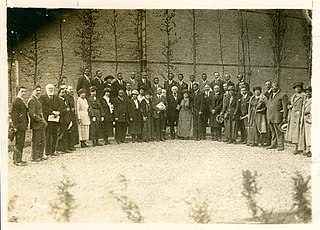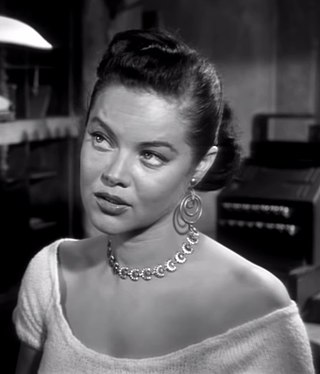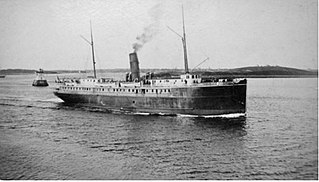Related Research Articles

William Edward Burghardt Du Bois was an American sociologist, socialist, historian, and Pan-Africanist civil rights activist.

Marcus Mosiah Garvey Jr. was a Jamaican political activist. He was the founder and first President-General of the Universal Negro Improvement Association and African Communities League, through which he declared himself Provisional President of Africa. Ideologically a black nationalist and Pan-Africanist, his ideas came to be known as Garveyism.

The Universal Negro Improvement Association and African Communities League (UNIA-ACL) is a black nationalist fraternal organization founded by Marcus Garvey, a Jamaican immigrant to the United States, and his then-wife Amy Ashwood Garvey. The Pan-African organization enjoyed its greatest strength in the 1920s, and was influential prior to Garvey's deportation to Jamaica in 1927. After that its prestige and influence declined, but it had a strong influence on African-American history and development. The UNIA was said to be "unquestionably, the most influential anticolonial organization in Jamaica prior to 1938," according to Honor Ford-Smith.

Garveyism is an aspect of black nationalism that refers to the economic, racial and political policies of UNIA-ACL founder Marcus Garvey.

The Pan-African Congress (PAC) was a series of eight meetings which took place on the back of the Pan-African Conference held in London in 1900. The Pan-African Congress gained a reputation as a peacemaker for decolonization in Africa and in the West Indies. It made a significant advance for the Pan-African cause. One of the group's major demands was to end colonial rule and racial discrimination. It stood against imperialism and it demanded human rights and equality of economic opportunity. The manifesto given by the Pan-African Congress included the political and economic demands of the Congress for a new world context of international cooperation and the need to address the issues facing Africa as a result of European colonization of most of the continent.

The Black Star Line (1919−1922) was a shipping line incorporated by Marcus Garvey, the organizer of the Universal Negro Improvement Association (UNIA), and other members of the UNIA. The shipping line was created to facilitate the transportation of goods and eventually African Americans throughout the African global economy. It derived its name from the White Star Line, a line whose success Garvey felt he could duplicate. The Black Star Line became a key part of Garvey's contribution to the Back-to-Africa movement, but it was mostly unsuccessful, partly due to infiltration by FBI agents. It was one among many businesses which the UNIA originated, such as the Universal Printing House, Negro Factories Corporation, and the widely distributed and highly successful Negro World weekly newspaper.

Hubert Henry Harrison was a West Indian-American writer, orator, educator, critic, race and class conscious political activist, and radical internationalist based in Harlem, New York. He was described by activist A. Philip Randolph as "the father of Harlem radicalism" and by the historian Joel Augustus Rogers as "the foremost Afro-American intellect of his time." John G. Jackson of American Atheists described him as "The Black Socrates".

Henrietta Vinton Davis was an elocutionist, dramatist, and impersonator. In addition to being "the premier actress of all nineteenth-century black performers on the dramatic stage", Davis was proclaimed by Marcus Garvey to be the "greatest woman of the Negro race today".
Afro-Caribbean people or African Caribbean are Caribbean people who trace their full or partial ancestry to Africa. The majority of the modern Afro-Caribbean people descend from the Africans taken as slaves to colonial Caribbean via the trans-Atlantic slave trade between the 15th and 19th centuries to work primarily on various sugar plantations and in domestic households. Other names for the ethnic group include Black Caribbean, Afro or Black West Indian or Afro or Black Antillean. The term Afro-Caribbean was not coined by Caribbean people themselves but was first used by European Americans in the late 1960s.

The African Blood Brotherhood for African Liberation and Redemption (ABB) was a U.S. black liberation organization established in 1919 in New York City by journalist Cyril Briggs. The group was established as a propaganda organization built on the model of the secret society. The group's socialist orientation caught the attention of the fledgling American communist movement and the ABB soon evolved into a propaganda arm of the Communist Party of America. The group was terminated in the early 1920s.
The Rastafari movement in the United States echoes the Rastafari religious movement, which began in Jamaica and Ethiopia during the 1930s. Marcus Garvey, born in Jamaica, was influenced by the Ethiopian king Haile Selassie. Jamaican Rastafaris began emigrating to the United States in the 1960s and 1970s, and established communities throughout the country.

The Messenger was an early 20th-century political and literary magazine by and for African-American people in the United States. It was important to the flowering of the Harlem Renaissance and initially promoted a socialist political view. The Messenger was co-founded in New York City by Chandler Owen and A. Philip Randolph in August 1917.

Placide Louis Chapelle was a French-born American prelate of the Catholic Church. He served as Archbishop of Santa Fe (1894-1897) and later Archbishop of New Orleans (1897-1905). Following the Spanish–American War, he also served as Apostolic Delegate to Cuba, Puerto Rico, and the Philippines.

Dona Drake was an American singer, dancer, and film actress in the 1930s and 1940s. She was typically being cast in ethnic roles including Latin American and Middle Easterners. Drake often presented herself as Mexican and went by the names Una Novella and Rita Novella. As Rita Rio, she led a touring all-girl orchestra in the early 1940s, also known as "Dona Drake and her Girl Band", among other names for her musical and dance acts.

The First Pan-African Conference was held in London from 23 to 25 July 1900. Organized primarily by the Trinidadian barrister Henry Sylvester Williams, the conference took place in Westminster Town Hall and was attended by 37 delegates and about 10 other participants and observers from Africa, the West Indies, the US and the UK, including Samuel Coleridge-Taylor, John Alcindor, Benito Sylvain, Dadabhai Naoroji, John Archer, Henry Francis Downing, Anna H. Jones, Anna Julia Cooper, and W. E. B. Du Bois, with Bishop Alexander Walters of the AME Zion Church taking the chair.
For a history of Afro-Caribbean people in the UK, see British African Caribbean community.

Black Cross Nurses is an international organization of nurses which was founded in 1920, based upon the model of the Red Cross. The organization was the women's auxiliary of the Universal Negro Improvement Association and African Communities League and was established to provide health services and education to people of African descent.
Wilfred Adolphus Domingo was a Jamaican activist and journalist who became the youngest editor of Marcus Garvey's newspaper, the Negro World. As an activist and writer, Domingo travelled to the United States advocating for Jamaican sovereignty as a leader of the African Blood Brotherhood and the Harlem branch of the Socialist Party.
Auguste Linstant de Pradines, also known as August de Pradines, Ti Candio or Kandjo was an influential Haitian musician who largely created the archetype of the Haitian troubadour. Over nearly five decades, de Pradines composed love songs as well as songs of political and social commentary, traveling throughout Haiti to perform in clubs, at private parties, in theaters, and outdoor rallies. de Pradines had twelve children, including his daughter Emerante de Pradines Morse who also became a prominent Haitian musician, as did her son, Richard Auguste Morse, and another of Auguste de Pradines' grandsons, Michel Martelly, who also served as president of Haiti (2011-2016).

The SS Yarmouth was a steamship notable for its part in developing Yarmouth, Nova Scotia, and connecting it to Boston, Massachusetts. Later in life it had a central role as the flagship of the Marcus Garvey initiative the Black Star Line. Marcus Garvey, known as the "black Moses", was a "back to Africa" evangelist, and his ideas, although radical and controversial in his own time and today, still remain influential. The Black Star Line's name, a play on the White Star Line, is remembered in the flag of Ghana.
References
- ↑ Ellis Island immigration records give his age on October 17, 1917, as "20 years, 5 months".
- 1 2 "Haïti, état civil, 1794-2012", , FamilySearch (https://www.familysearch.org/ark:/61903/1:1:6F5W-P2R6 : Sat Nov 18 04:30:20 UTC 2023), Entry for Jean Dédier Eliezer Cadet Cadet and Mésinor Pierre Cadet, 16 Jun 1897.
- ↑ Le Musée Vivant 24 Année Série D Numero 8, October–December 1960, p. 159.
- ↑ Race First, by Tony Martin, Dover, Massachusetts: Majority Press, 1976, p. 122.
- 1 2 "Haïti, état civil, 1794-2012", , FamilySearch (https://www.familysearch.org/ark:/61903/1:1:W6QT-KHN2 : Sat Nov 18 12:01:20 UTC 2023), Entry for Jean Didier Eliezer Cadet and Claudet Exumé, 16 Dec 1995.
- 1 2 Hill, Robert A. (1983). The Marcus Garvey and Universal Negro Improvement Association Papers: 1826-August 1919. University of California Press. p. 308.
- ↑ Thomson, Ian (2012). Bonjour Blanc: A Journey Through Haiti. Random House.
- ↑ Colin Grant: Negro With a Hat. The Rise and Fall of Marcus Garvey, Oxford University Press, 2008, pp. 174 f.
- ↑ According to Ellis Island immigration records.
- ↑ Colin Grant: Negro With a Hat. The Rise and Fall of Marcus Garvey, Oxford University Press, 2008, pp. 176-83.